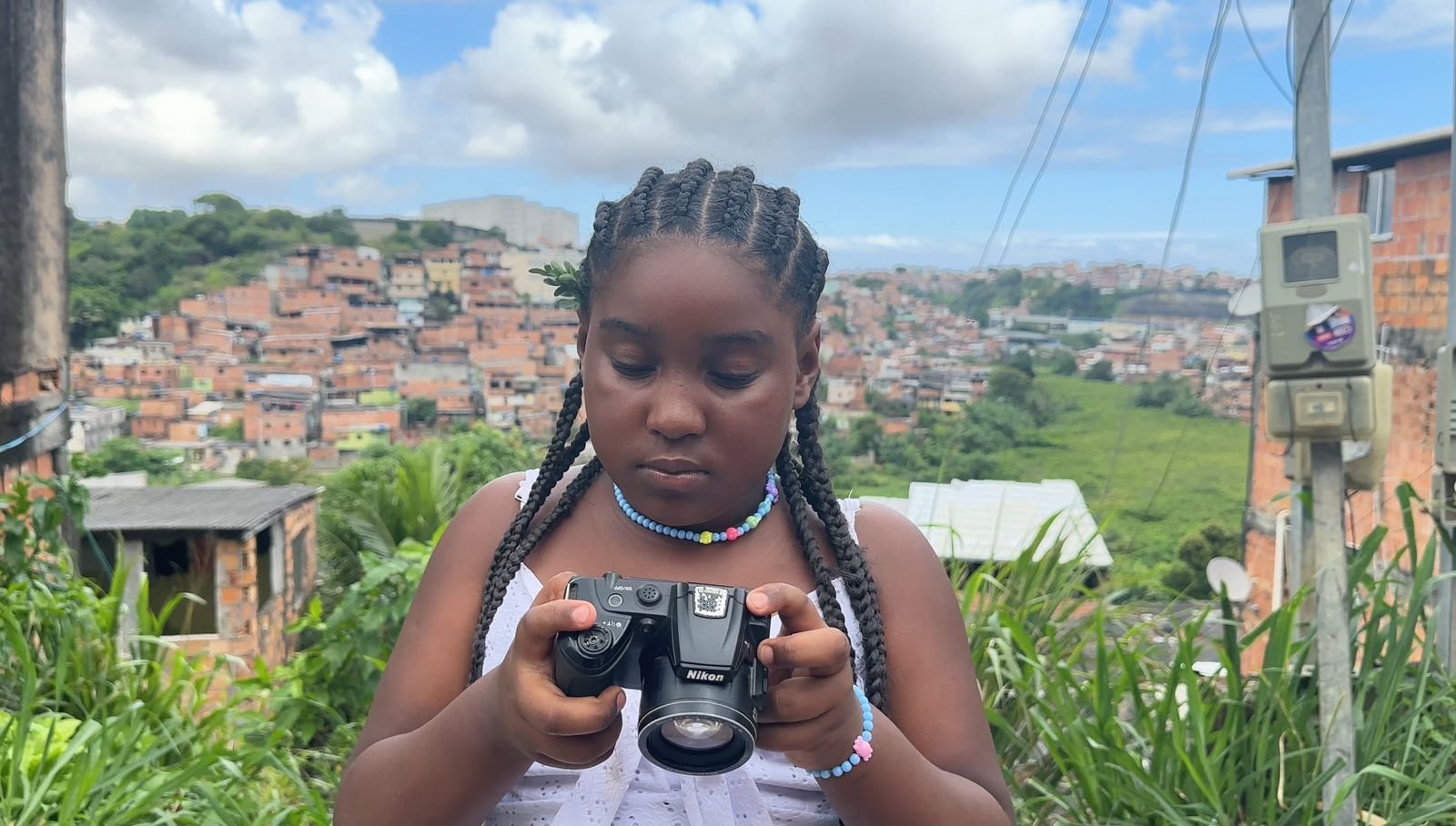#BRAVEFUTURES: SALVADOR, BAHIA, BRAZIL (2024)
After a successful competitions around the globe we mounted this edition of #BraveFutures in Salvador, Bahia, located on the coast of Brazil. Using one intersectional theme, one prop and one action, we challenges one selected team in each city to create a film in 48 hours.
Participants registered for a chance to be selected by OTV and our community partners at DIALAB . We then curated six teams comprising of up four individuals with a wide range of talents, skills levels and filmmaking experiences and provided them with production resources and mentorship to help bring their films to life.
After the six films were completed and submitted, we hosted a premiere + awards ceremony at Cine Glauber Rocha, one of Brazil premiere independent cinema houses. The SOLD OUT premiere + awards ceremony featured an opportunity for their films to be voted on by the public for a chance to win one of six people's choice awards, and one OTV-juried award.
This special edition of #BraveFutures was like no other 48 hour film competition and we are excited to continue evolving the format, building community, creating space for joy and brave art-making.
Unlike traditional film races that place an emphasis on technicality and production value (i.e. cinematography, acting, original score, etc.) OTV chose to focus on diverse awards that created more opportunities for inclusion, inspiration and impact.
#BRAVEFUtures Salvador SELECTIONS (2024)
Piracema (03:17)
Serena and Juca are twin brothers. They arrive at Feira de São Joaquim, where their father works, after a morning at school. Before the two can make any attempt to help him in the store, his father encourages them to go have fun and then go back to study. The brothers run to the seaside to play and an event surprises them, catching their attention. From there, they dive into an experience that dissolves the boundaries between the real and the imaginary, the worldly and the spiritual.
Serena e Juca são irmãos gêmeos. Eles chegam à Feira de São Joaquim, onde seu pai trabalha, após uma manhã na escola. Antes que os dois pudessem fazer qualquer menção de ajudá-lo na loja, o pai os encoraja, para que vão se divertir e depois voltem para estudar. Os irmãos correm até a beira do mar para brincar e um acontecimento os surpreende fisgando sua atenção. A partir daí eles mergulham em uma experiencia que dissolve as fronteiras entre o real e o imaginário, o mundando e o espiritual.
PRÊMIO FILME MAIS CELEBRADO // MOST CELEBRATORY FILM AWARD
CUMBUCA — Alan dos Anjos, Ilka Cyana, Bel Abreu, Filipe Duarte
Se nos faltarem palavras, o mar conta a nossa história (04:22)
On a beach in Salvador, two black women, Joana, a mature woman who has seen a lot in this life, and Yara, a young woman at the beginning of her journey, meet to share their experiences. Two women connected by the force of the sea.
---
Em uma praia de Salvador, duas mulheres negras, Joana uma mulher madura que já viu muito nessa vida, e Yara, uma jovem mulher no começo da sua jornada, se encontram para compartilhar suas vivências. Duas mulheres conectadas pela força do mar.
PRÊMIO FILME MAIS TRANSCENDENTE / MOST TRANSCENDENTE FILM
PÉ DE SAL — Agnes Aguirre, Hyndra, Leyzi Borges, Jon Gonçalves
CABOQUINHOS (06:06)
Three mestizos from the city of Salvador and Recôncavo Bahia, here called caboquinhos, narrate their memories, notions and perspectives on their Afro-indigenous lineages in a Brazil plagued by the genocide of the black population and original peoples, since the period of colonization. At the same time, the documentary revisits memories and ritualistic movements where dance is linked to the sacred, based on the re-imagination of caboclos, mixed-race deities between these two subjugated peoples.
--
Três mestiços da cidade de Salvador e Recôncavo baiano, chamados aqui de caboquinhos, narram suas memórias, noções e perspectivas sobre as suas linhagens afro-indigenas em um Brasil regado ao genocídio da população negra e dos povos originários, desde o período da colonização. Ao tempo, em que o documentário revisita memórias e movimentos ritualísticos onde a dança é ligada ao sagrado, a partir da re-imaginação dos caboclos, divindades mestiças entre esses dois povos subjugados.
PRÊMIO FILME MAIS SOTEROPOLITANO // MOST SALVADORIAN FILM
CABOQUINHOS —Bruninho, Karamujinho, Matheuzza, Danilo Cerqueira
Um Dia de Negão (07:08)
Three black trans men face manifestations of their unconscious while living their routines in the Northeast of Amaralina. Each encounter reflects his internal struggles and the pressures of a society that demands rigid masculinity. Amid these experiences, they share reflections on the expectations of being a black trans man and seek to build a healthier masculinity, free from stereotypes.
--
Três homens trans negros enfrentam manifestações de seus inconscientes enquanto vivem suas rotinas no Nordeste de Amaralina. Cada encontro reflete suas lutas internas e as pressões de uma sociedade que exige uma masculinidade rígida. Em meio a essas experiências, eles compartilham reflexões sobre as expectativas de ser um homem trans negro e buscam construir uma masculinidade mais saudável, livre de estereótipos.
PRÊMIO FILME MAIS OUSADO // MOST BRAVE FILM AWARD
OBARÁ — Analu, Rebeca Carmo, Enzo Karin, Zaire Òmìnira
Cantos da Cidade (06:56)
Amara, a black woman from the city of Salvador, tries to rise and become strong again after one of the most painful moments of her life; the loss of his younger sister. Dealing with grief, she receives unexpected help from the city where she lives, through new paths she has an unexpected encounter with faith.
---
Amara, uma mulher negra da cidade de Salvador, tenta se reerguer e se fortalecer novamente depois de um dos momentos mais dolorosos de sua vida; a perda da sua irmã mais nova. Lidando com o luto, ela recebe uma inesperada ajuda da cidade em que vive, através de novos caminhos percorridos ela tem um encontro inesperado com a fé.
PRÊMIO FILME MAIS INTERSECCIONAL // MOST INSTERSECTIONAL FILM AWARD
CANTOS DA CIDADE — Marília Ramos, Andréa Brandão, Mari BZE, Austine Lopes
pangeia (06:58)
On the outskirts of Salvador, 12-year-old Sophia and her friends transform everyday life into a movie, inviting locals to tell their stories. While the children film, they challenge the expectations of adults Jeisa, Moreno and Rose, leading them to revisit their own dreams. The idea for Pangeia emerges, revealing that true value lies in unity and in the present. “Pangeia” celebrates the power of dreams and collective creativity, where the impossible becomes reality.
--
Na periferia de Salvador, Sophia, de 12 anos, e seus amigos transformam o cotidiano em cinema, convidando moradores para contar suas histórias. Enquanto as crianças filmam, desafiam as expectativas dos adultos Jeisa, Moreno e Rose, conduzindo-os a revisitar seus próprios sonhos. A ideia de Pangeia surge, revelando que o verdadeiro valor está na união e no presente. “Pangeia” celebra a força dos sonhos e a criatividade coletiva, onde o impossível se torna realidade.
PRÊMIO FILME MAIS INOVADOR // MOST INNOVATIVE FILM AWARD
PRÊMIO THE TIME IS NOW // THE TIME IS NOW AWARD
PEGAPACAPÁ — Michelle da Silva, Xavss, Leandro Cardoso, Klismann Schramm






